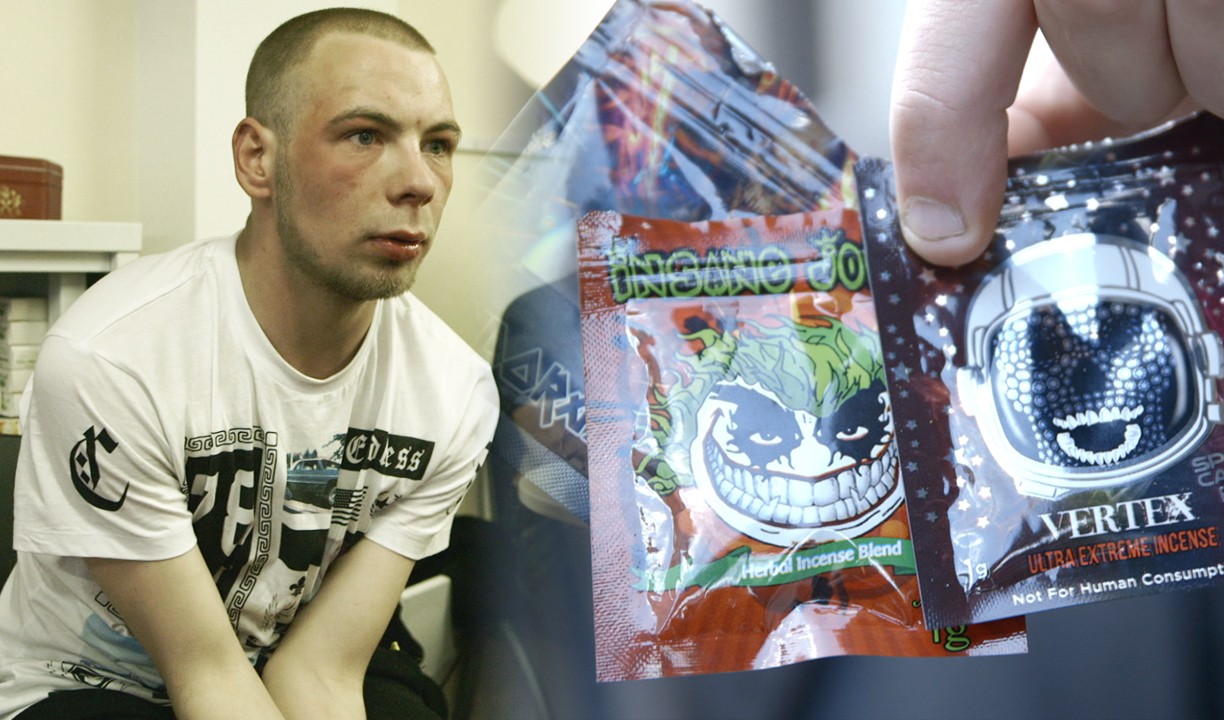(Top photo: Jake Lewis)New NHS figures have revealed the number of people admitted to hospitals in England with drug-related mental health problems has doubled in a decade.In 2015-16 there were 81,904 admissions into hospital psychiatric units for drug-related mental health or behavioural disorders, compared to 38,005 in 2005-06. The rise has been accompanied by a similar jump in admissions to hospital for drug overdoses, with 15,074 cases last year, a 51 percent jump from 2005-06. And it's not all ageing drug users being admitted to hospital with mental or physical drug emergencies; nearly half of those admitted were aged under 35.At first, these statistics appear counterintuitive, since over the last decade the use of illicit drugs – from heroin to cannabis – has declined. But dig a little further and the drivers behind this trend become apparent. To those working on the frontline, who see people coming into hospital psychiatric units day-in, day-out, usually after being sectioned or brought into A&E by family or friends, there are two combined forces causing this increase in severe drug meltdowns: high potency skunk and the deepening impact of austerity.I spoke to Dr Derek Tracy, a Consultant Psychiatrist based at the Princess Royal Hospital in Bromley. He is also a Clinical Director for the Oxleas NHS Foundation Trust, which provides mental health services in south-east London."The majority of people being admitted for drug-related mental health problems in my experience have cannabis-induced psychosis," he told me. "We see people who have been smoking cannabis on a regular basis for years, but who've been destabilised after going onto smoking skunk. It's like someone drinking four pints of lager a day and then suddenly switching to triple strength lager. It's going to trip you up." A bag of skunk is far more potent than the hashish and bog standard weed that were more common in Britain up to a decade ago.But it's not all cannabis. Synthetic cannabinoids such as Spice have increasingly come up in hospital admissions over the last few years in south-east London. Although Spice represents a small proportion of admissions, according to Dr Tracy, patients suffering from problems with the drug can present more extreme or harder to treat cases."Although the number of cases are in the minority, Spice can be a bigger problem with patients than skunk because of its higher toxicity in some individuals, and also a physical dependence I have not seen with cannabis. Patients can be quite agitated and occasionally aggressive, suffer from withdrawals, and we are seeing some who are resistant or take longer to respond to standard medical treatment," says Dr Tracy.
WATCH: 'Spice Boys: The Hard Lives of Britain's Synthetic Cannabis Users'
He points out that the second most common problem drugs are stimulants, such as cocaine, speed and ecstasy, although says these drive fewer impatient hospital admissions compared to cannabis cases. More crucially, says Dr Tracy, the services that are meant to prevent people reaching crisis point are either failing them or non-existent. Cuts to drug and mental health services since 2010 have left drug users with a reduced chance of getting appropriate, drug-focused help outside of a hospital setting.As with most local services, drug services have experienced extensive cost cutting since 2010, including £200 million in public health cuts in 2015. An independent assessment of the impact of austerity on the drug treatment sector published last year found a large proportion of residential rehab and community drug services had experienced a drop in funding. Those running drug services admitted that lack of funding meant their ability to help drug users with mental health problems was steadily worsening.The upshot is that hospitals are more frequently being left to heal a deep-seated problem by applying a psychiatric sticking plaster, in the shape of anti-psychotic or sedative drugs on a hospital ward."It's harder to get help at drug services, so they end up coming to the acute unit when they are in crisis at 2AM in the morning," says Dr Tracy. In his experience, a large number of admissions are people returning again and again. "Sometimes I see people being re-admitted four, five or six times in six months. With respect, this is a huge waste of five weeks of hospital time when investment in helping people in the community – in proper drug services, which can look at their lifestyle – is much more efficient."The city with the highest number of drug-related mental health hospital admissions per head is Liverpool. It is also a city that has suffered huge public spending cuts since 2011 and where, forebodingly, the NHS has just announced a £2 million budget cut for addiction treatment services.Yasir Abbasi, a consultant psychiatrist at Mersey Care NHS Trust, which provides mental health and drug services in the city, says widespread cuts to services in Liverpool have exacerbated problems associated with acute and chronic drug problems."A number of charities and non-statutory services that provided recovery and harm reduction work in the community have either closed down due to lack of funds or just shrunk," said Abbasi. "On top of this, the social care sector in Liverpool is under immense pressure and is finding it difficult to cope. This affects housing, income, diet and the care of a lot of people, which eventually increases their risk further."Cuts to drug services across Britain have been compounded by significant cuts to mental health services, with over half of mental health trusts forced to cut the number of beds available for patients in crisis, such as those admitted for drug psychosis. Last year a report delivered a damning verdict on the state of mental health in austerity Britain, citing rising suicides, lack of access to emergency beds and long waiting lists.
"The rise in drug-related psychiatric admissions is the canary in the mine," Ian Hamilton, a lecturer in mental health at the University of York, told me. "We are beginning to see the real impact on people who should be being helped in community settings: they are becoming dangerously unwell and need to be admitted to hospital."Drug and mental health services have been cut to the bone. Most of these admissions are people with cannabis psychosis, and what's worrying is that we have so little evidence of how to treat problem cannabis use, and perhaps that is because it is a prohibited drug."@NarcomaniaMore on VICE: What Happens If Your Number Is Found On a Drug Dealer's Phone?Doctors Would Rather You Take Weed Up the Butt Than Smoke ItMeet the Weed Models of Instagram
Advertisement
Advertisement
WATCH: 'Spice Boys: The Hard Lives of Britain's Synthetic Cannabis Users'

He points out that the second most common problem drugs are stimulants, such as cocaine, speed and ecstasy, although says these drive fewer impatient hospital admissions compared to cannabis cases. More crucially, says Dr Tracy, the services that are meant to prevent people reaching crisis point are either failing them or non-existent. Cuts to drug and mental health services since 2010 have left drug users with a reduced chance of getting appropriate, drug-focused help outside of a hospital setting.As with most local services, drug services have experienced extensive cost cutting since 2010, including £200 million in public health cuts in 2015. An independent assessment of the impact of austerity on the drug treatment sector published last year found a large proportion of residential rehab and community drug services had experienced a drop in funding. Those running drug services admitted that lack of funding meant their ability to help drug users with mental health problems was steadily worsening.
Advertisement
Advertisement
Unfortunately, help for cannabis problems is limited, not just by a lack of money, but insufficient knowledge – due to the drugs' illegality.Last month, "Black Sheep: An Investigation into Existing Support for Problematic Cannabis Use", a report published by think-tank Volteface, found that despite a growing demand for help with problems with the drug, cannabis remains a neglected drug in public health. Promises by successive governments that they will address the issue have not materialised.Black Sheep said that because cannabis is illegal, attracting people to get help is "just fumbling around in the dark trying to find them". The report revealed that among people showing signs of cannabis dependence, only 14.6 percent had ever received treatment, help or support.Of several psychiatrists I spoke to, all mentioned cuts to services and increased use of skunk as being the main cause of the rise in admissions, with the use of new psychoactive substances – such as Spice and mephedrone – and recreational drugs such as cocaine, speed, GHB, ketamine and crystal meth in a minor, but noticeable number of cases."Because cannabis is illegal, attracting people to get help is 'just fumbling around in the dark trying to find them'."
"The rise in drug-related psychiatric admissions is the canary in the mine," Ian Hamilton, a lecturer in mental health at the University of York, told me. "We are beginning to see the real impact on people who should be being helped in community settings: they are becoming dangerously unwell and need to be admitted to hospital.
Advertisement
